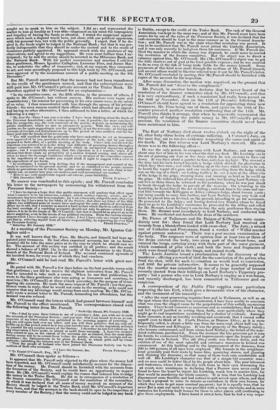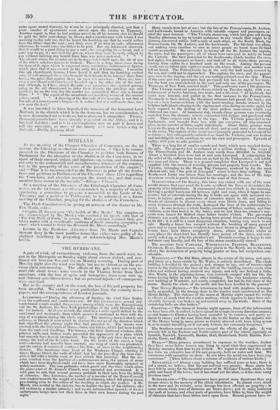The Earl of Norbury died about twelve o'clock on the
night of the 3d, after forty-three hours of extreme suffering. A Coroner's Jury, on the next day, sat to receive evidence respecting the cause and agent of his death. The first witness was Lord Norbury's steward. His evi- dence was to the following effect— He was the only. person in company with Lord Norbury, and was within about nine feet of film hi his rear wilco the shot was fired. Ihis Lordship was its the act of' pointing out fbur or five trees which he was anxious to have cut down. It was then about a quarter to four, and dour daylight. The steward a the time hail his back turned towards a hedge which skirted the plantation in which they then were ; and while looking up at the trees which were to be cut, he heard the report of a gun, and saw smoke proceeding from the hedge which was on the top of a ditch : oil looking further, lie saw a man at the other side of the hedge in the gripe, stooping down and running as hard as he could up the gripe. He followed luiiu about twenty yards; but hearing Lord Norbury cry out two or three times, he returned to clis assistance, when he was just about to break through the hedge in pursuit of the teseissm. On returning to his Lordship, he 'found him 111 the act of' fitliiuig ; alitl took him in his arms and car- ried I ' towanls the Kilbeggan or Abbey entrance-lodge, about twenty yards; but being unable to early Juni further, and Lord Norbury being very weak and faint, he pliwed him on his lswk on the ground, intending to go for assistance. Ile proceeded to the lodge ; ;Ind having desired two females whom Ile found there to go to his Lordship's assistance, he proceeded to the Abbey and called for Mr. Stewart, Lord Norhury's son-in-law, the only gentleman then staying there. Mr. Stewart went immediately to Lord Norbury, and conducted him home. He recollected and described the dress of the murderer.
Dr. Pierce of Tullamore and Dr. Duigan of Killbeggan were imme- diately sent for : they found that Lord Norbury had received six wounds from a blunderbuss loaded with swan-shot. The Jury, a mixed one of Catholics and Protestants, found a verdict of "Wilful murder against persons unknown." There was a post mortent examination of the body. The surgeons were of opinion that at least two or three of the drops entered the body, tore away part of the breast-bone, and entered the lungs, carrying away with them part of the outer garment, which consisted of pilot cloth ; and both the bone and fragments of cloth were found lodged in the lungs, and caused death. The Lords Justices issued a proclamation for the discovery of the murderer ; offering a reward of NU for the conviction of the person who fired the shot, 300/. for such in'i'ormation as would lead to conviction, and 2001. for private information. It seems to be generally supposed that the murder was committed by one of a large number of tenants recently ejected from their holdings on Lord Norbury's Tipperary pro- perty; but a person who was in Lord Norbury's employ as a watchman, and recently discharged, has been committed to Tullamore gaol on suspicion.
A correspondent of the Dublin Pilot supplies some particulars respecting the late Earl, which give a favourable view of his character, and the treatment of his tenantry— "After the most persevering inquiries here nod in Tullamore, as well as on the spot where this nobleman was assassinated, I have been unable to ascertain what was even the alleged cause for the perpetration of this awfully mysterious murder. nave heard rumours so numerous and so contradictory, that I should not feel myself justified in setting them forth, more particularly where they might go to cast imputations unsustained by a shadow of evidence. Amongst those rumours, is one so horribly revolting and unnatural, that I cannot suffer myself even to think of it. Castle Burrow, or Darrow Abbey, as it is more frequently called, is situate a little way from the main road, about half way be- tween Tullamore and Kilbeggan. It Was the property of the Stepney family ; who became embarrassed, and from whom Lord Norbury, the father of the mur- dered nobleman, purchased it. Froin the moment the late possessor got it into his hands, he commenced builaings and improvements upon the largest scale Of any nobleman in Ireland. The old abbey castle was thrown down, and the erection of one of the most splendid and extensive mansions in Ireland was coinmenced. At this building and in the improvement of the demesne, from
200 to 300 persons of all ages were employed. his tenants in the neighbour- hood generally paid their rents by horse-hire, quarrying stones, and planting and draining the demesne; so that many of them were very comfortable and
well off. His Lordship's character was that of a siniple but eccentric man; and no man could be better liked by the people about him. The poor labourers
and tradesmen, whom I saw this day with tears in their eyes bemoaning the ad event, were unanimous in declaring that a Durrow man never could be found to have the heart toinjure his Lordship, much less to murder him, for that would be murdering the whole country. It is true that his Lordship had dispossessed some &milieu, and had notices to quit served upon others, and that he made a proposal to some to remain as caretakers in their own houses, for
which they were to get some nominal payment ; but it is equally true, that he never put a man out until he was provided with a house elsewhere, and in some instances his Lordship built houses for theta in other places. still continuing to give them employment. I have heard it stated here, that he had a very unpo- pular agent named. Garvery, by Wm' he was principally directed, and that a great number of ejectments were served upon the estates in Tipperary. Another report is, that he had notices served on all his tenants that he should. be paid the tithe rent-charge by them; and a coanteyman with whom I was speaking to-day told me, that he heard his Lordship say that he would rather hare the tithes than the rent ; and that, even if he were to make allowances otherwise, he would cause the tithes to be paid. But my informant observed, that it would be a good thing to pay a man who was giving them bread, and a good way to pay it ; and that the parson, whom they were firmerly obliged to
pay without deriving any benefit from him, was never molested. * * * The church where the remains are to be depoelted is built upon the site of' one of the oldest religious houses iii Ireland. There is a large stone cress fiwing time door of it, upon which is engraved many mysterious emblematieal figures, which show that it was erected in the early days of Christianity. I mention this old churchyard, because I have tweed it said that his Lordship excited some ill-will amongst those who brought their friends to he interred there front having the gates shut against them on some fsw oecasit»ts. There aye, how- ever, a new chapel awl clotrelvard founded opt the mile'. ',hie of the road;
and although, as I have stute.1, the gate was ci ii ir mu. li t fIrtillSt persons going to the old churchyard to inter their friends, the privilege was still granted; for on the very atty the murder was committ.11 there was a funeral there. * * The report of' the min at oral and revolting swim; of the murder gains ground. * * A drawing of the shoe-sole of the as.;assin, is not that of the sole of' a countryman's brogue--it is rather that of a mvell-inade shoe, nar- row near the heel."
It was intended to have deposited the remains of the lamented Lord Norhury in the church which is in the demesne, but on consideretion, it is now determined not to to do so, hut to alemeon it altogether. Twenty thousand pounds have been already es pstitled on the Abbey, and it is but hell' finished ; and it is iu contemplation now to pull it down and sell the materials, as nom. -of the family NV il now reside a day in
.Erening



























 Previous page
Previous page